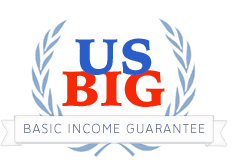UBI Activism Surging in the U.S.
Michael Howard
Coordinator, USBIG
Two years ago, if one were to speak of a basic income movement, one might be accused of hyperbole. USBIG was able to muster support for annual congresses, in cooperation with the Basic Income Canada Network, and disseminate information and analysis through the website and newsflash. By 2017 there was enough growing interest to move the US Congresses from a room at the Eastern Economic Association Meeting to the space afforded by the Silberman School of Social Work. But UBI was still more an academic and social media than a social movement phenomenon. There were emerging organizations, in addition to USBIG, such as the Universal Income Project, and Basic Income Action, but all were starved for volunteers, with the exception of the well-funded Economic Security Project. ESP* has been funding pilot projects in Stockton, California, and elsewhere, and these have gotten a lot of media attention, but this was still far from a social movement.
Then came the Yang campaign, putting UBI on the national agenda. In the year since Andrew Yang spoke to the 2019 NABIG Congress, voters and campaign contributors catapulted Yang into the national Democratic presidential primary debates. In the wake of that remarkable campaign, Yang has created a new organization, Humanity Forward, which is, among other things, distributing cash to individuals suffering from the Covid-19 pandemic, giving $250 to 20,000 Americans.
Another spin-off from the Yang Gang is the Income Movement, already with 65,000 members across the US, and several thousand internationally. IM is focusing on a letter writing and phone call campaign to the Senate to get them to endorse the Harris / Sanders / Markey proposal for $2000 / month / person for the duration of the crisis. Six cities participated in the Shake Up Congress Car Parade, most with state and federal congressional UBI candidates participating. On the agenda are 1. Organizing a second annual Basic Income March, designed to take account of the health and well-being of the participants; 2. Building alliances with groups like the Poor People’s Campaign and the Justice Collaborative; 3. legitimizing UBI as a political movement, demonstrating voting power, and lobbying for the inclusion of UBI in the Democratic platform; and 4. continuing work on the Covid-19 action plan.
Additional candidates for national office are running on basic income platforms, including David Kim (California), Charles Booker (Kentucky), James Felton Keith (New York), and Mike Broihier (Kentucky). Over 20 Congressional candidates have taken the UBI pledge.
The latest organization to appear is the UBI Action Network, a non-profit organization focused on passing UBI legislation at federal and state levels. UBIAN is adding its support to a call for an Emergency UBI monthly of $2000 to every adult and $1000 to every child for the duration of the pandemic. They also support legislation that moves in the direction of a UBI, such as the Boost Act, a $250 per month per adult, $500 per family, ($3000-6000 annual) supplement to the Earned Income Tax Credit, with the crucial addition that the credit is fully refundable, making it a small negative income tax; and the American Family Act, which would expand, increase, and make fully refundable the Child Tax Credit, and pay it on a monthly basis.
With coordinated mass actions in the streets, and on social networks, and legislators considering UBI or UBI-like legislation at federal and state levels, we can now confidently say that there is a basic income movement in the US. Join USBIG to get informed, and join other organizations to become involved in an increasing diversity of actions.
*Full disclosure: ESP provided a small organizational development grant to USBIG.



Trackbacks & Pingbacks
[…] To read the article, click here. […]
Leave a Reply
Want to join the discussion?Feel free to contribute!